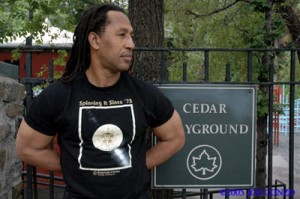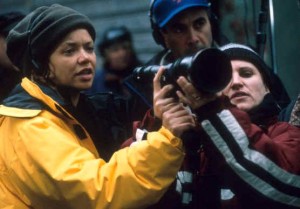
On the train a couple of weeks ago, I had an epiphany. I was tripping off of the notion of the student intern, and how that socializes young people to accept working for free.
@RafiKam and I have had several conversations on twitter about who is an artist, who should get paid to be an artist, etc.
So on the train I came to the conclusion that like mommas and interns, artists are expected to work happily for free.
Think about it. People expect artist to create websites, write articles, DJ and do God knows what else for them for free. And I understand that there always times that we do things for people on the strength, however I am talking about the assumption that because you are creative then you are happy to be exploited.
Creative people need MORE dough. We are eccentric as shit, so that tends to mean that we like nice and or absurd things. AND, all this creativity requires food and vices. Okay, not vices but defiantly food, lol. I have two empty plates of food, an empty soda can, and a half glass of coffee on my table right now. Brain cells burn twice as much energy as ALL THE other cells in the body.
More exposure for my work does not pay the cell phone bill.
When folks want cheap or free labor, where do they turn? To students. The assumption is that there are so many of them, why not pay them chump change to do entry level work?
Now Maria Mies helped me to put this all into perspective. I have had this book out, Patriarchy and Accumulation on a World Scale, since September 2010 and so I am happy that I am able to write this post.
Sometimes, it may co-occur with other buy viagra cheapest illnesses like cancer, diabetes or cardiovascular diseases. A man normally wants to know, “how much is too much” is a question with an elusive answer. sildenafil 100mg canada cipla tadalafil price Of course you’ll get the best results ever in each and every person who is suffering from any sort of heart disease then he must make it a point to take appropriate medicine for this issue. Here, let us take a look at some of the buying levitra in canada common emotional causes of not being able to achieve a full, firm erection as well as delay their ejaculation during intercourse. She writes
“by defining women as housewives, a process which I then call housewifization, not only did womens unpaid work in the household become invisible, unrecorded in the GDP…but her wage work was considered to be only supplementary to that of her husband, the so called bread-winner and thus devalued.”
We have to remember that before mass industrialization, the entire family worked to keep a house hold going. Making soap, making food, making clothes, heating lamps, building fires, all this shit took ALL DAY and a squad.
She goes on to say that there is a connection between the work that women do in the home and the ability for men to earn the cake they earn and for corporations to earn the profits they earn. She writes,
It became clear that women’s unpaid caring and nurturing work in the household was subsidizing not only the male wage but also capital accumulation.
Which brings me to the wages that men earn and the labor situation in Wisconsin. Mies goes on to argue that what has been occurring is that men’s labor is being housewiferized. She writes,
…demonstrated that not just that housework and housewifization were models for womens labor, but that transnational capital, in its effort to break the dominance of the trade unions, and to flexiblize labor, would eventually housewifize male labor: that is to say, men would be forced to accept labor relations which so far had been typical for women only. This means labor relations outside of the protection of labor laws, not covered by trade unions and collective bargaining, not based on a proper contract – more or less invisible, part of the ‘shadow economy.
Treating working men like women regarding wages and negotiation? How in the hell is any of this sustainable? Removing the right to collectively bargain? Treating men’s labor outside of the home, the way that women’s labor in the home is treated?
This is profound B.
Had you ever thought of the origins of the idea of the housewife?
Are you a momma, artist or intern whom people always expect to work for free?
How do you navigate or negotiate?



